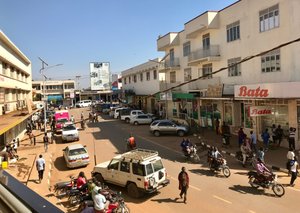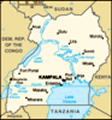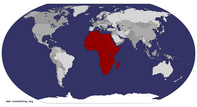Advertisement
Published: July 30th 2018

 IMG_6203
IMG_6203
Downtown MbararaIt’s hard to believe we have just finished our 10
thweek in Uganda, and are just starting on our final week of hospital rotations in Mbarara. The time has flown by, and Mbarara has been very different than what I expected. I remember early on in this experience I thought our three-week community placement would be the most difficult leg of the trip, and that our time in Mbarara would fly by as we have access to more amenities here. I have been very surprised to find that it’s been the opposite. Although we have access to running water, electricity, showers/toilets/mirrors, supermarkets, restaurants and are no longer sleeping on bunk beds all in one room, I have actually found myself missing many things about our time in Ruhija, and have found Mbarara to be more difficult for various reasons. This summer has been an interesting lesson on happiness and at times sanity, as you experience many different emotions living without the comfort of your friends and family in a very foreign setting. This experience has pushed me out of my comfort zone in ways I didn’t know it would, but I have learned so much through all the difficult and “character building”

 IMG_6320
IMG_6320
Brooke entertaining one of our favourite patients Ethantimes.
While our home/building in Ruhija did not have running water or power, at times I would prefer that to the inconsistency we have experienced in our houses in Mbarara. In house 4b we consistently have water to our toilets and shower, but our kitchen and bathroom tap are both very iffy. Our first week here we called the plumber many times about our bathroom tap, but after 5 weeks we have learned that you actually can get it to work, you just have to open the tap and turn on the shower to get the water to flow. While the water sometimes flows in house 4b, house 3a where Brooke, Chelsey, Cydnee, Kari and Shania has been completely out of water for the majority of this week, and they have relied on hauling water from the nearby tap in order to take a bucket shower or flush their toilet. Along with an iffy water situation, power has been spotty as well. As power runs on hydro here, we have learned that power is spottier during dry season, which we have been in during our stay in Mbarara. We had become accustomed to power outages during the day while

 IMG_1062
IMG_1062
Afripad Education in Kiberere communitywe are work, but there have been times the power has gone out when we are in the middle of cooking a meal, and this has been extremely frustrating. We all experienced our longest power outage last weekend, when the power went out from Friday evening until Sunday evening. It was the longest outage any of us had ever experienced, and I was surprised at how much it affected my mood. While you expect a power outage means you find a way to live with no wifi, lights or being able to charge devices, it also means you are unable to cook and eventually have to throw out all the food in your fridge if the outage is long enough. I don’t think I speak alone when I say we all found that weekend to be extremely frustrating, and we pray it does not happen again.
While I do surprisingly miss our accommodations and the beautiful setting of Ruhija, I am happier working at the hospital here than I was at Ruhija HCIII. Brooke and I spent our first three weeks in the Malnutrition ward, as we felt this would be the area we could have the most impact

 IMG_6344
IMG_6344
The market and our favourite vendor Sarah's standand be the biggest help. Unfortunately, prior to our arrival there had been a measles outbreak in Uganda, and the malnutrition ward had temporarily become the measles ward. At times this was comical as all the nutrition personnel still spent a fair amount of time in the measles ward, and we even got asked if we wanted to see the viral hemorrhagic fever patient (Ebola?) while we were already in the measles ward. We kindly declined, and after week two we vowed we would stop testing the limits of our MMR vaccines, and stay clear of the area. The malnutrition ward did still exist, as a corner in the pediatrics (Toto) ward. We spent the majority of our time here, learning the reasons why malnutrition may exist in Uganda, and understanding the proper treatment. We had learned about something called “refeeding syndrome” (think holocaust survivors who died post release due to high food intakes), but had never had the chance to witness this level of risk until now. The Doctors and other nutrition students in the ward explained to us that malnutrition here is mostly an income and education issue. Uganda, and specifically south western Uganda where we currently are,

 IMG_6426
IMG_6426
All the nutrition students during our first outreach dayis known as a “fruit basket”, where food grows in abundance, and food rotting before it can be consumed is actually more of an issue. Because of this Uganda really doesn’t have a huge food security issue, and malnutrition is mostly secondary to another condition, or occurs if a family is too poor to save the food they personally grow, or due to education gaps that result in families only feeding their children starchy foods for breakfast, lunch and dinner which can result in many micronutrient deficiencies along with protein deficiency.
One of the hardest and most shocking observations about the malnutrition ward was how small the babies/children were for their age. At first glance you assume many of the children are newborns, but in reality that tiny baby may be past 2 years of age. It was really shocking to hear the true ages of many of the children, and sad at how developmentally delayed they currently are. We witnessed a few children with severe edema up to their face, and also witnessed the skin of some children deteriorating due to protein deficiency.
One of the best parts about the nutrition ward, was that we got the

 IMG_6509
IMG_6509
Brenda teaching us how to make chapatti chance to meet many nutrition students who were in Mbarara temporarily for their clinical rotations. We were able to learn a lot about nutrition issues in Uganda (such as micronutrient deficiencies due to low consumption of vegetables – something we weren’t surprised to hear), and we were also able to accompany them on two nutrition outreach days, where we conducted malnutrition screening and educated on the importance of balanced meals in two villages near Mbarara. While it was great there were so many students around for us to meet, at times that has meant there has been no work to be done on the ward. During one of our mornings a Doctor on the ward mentioned how important brain development is for the children, and that because they don’t have a playroom, lots of the kids are very under stimulated during their stay, which does not aid in their healing process. The Doctor said that even just smiling at the kids, or trying to get them to smile can do wonders. Brooke and I really took this to heart and started devoting our time to try and get smiles out of some of the more serious patients. We used medical

 IMG_6728
IMG_6728
My new pet at the goat pass-on ceremonygloves we brought from home as balloons, and drew funny faces on them. These were a big hit with the kids, and we were even successful in getting some of the most stubborn children to smile with this tactic. Surprisingly something this small, has been one of the most rewarding things we’ve done during our time at the hospital.
Along with the hospital we have also been engaging in other community work during our time here. Kylee and I got to spend a Saturday out in the field with Vets Without Borders vaccinating and ear tagging goats. This was a cool experience as it is likely the first and only time I draw blood from and vaccinate a living creature. Along with helping out in the field, we also got to be a part of the goat pass-on project and ceremony, as Shania talked about in the previous blog. I really enjoyed the pass-on ceremony, as I feel Vets Without Borders has created a really cool and sustainable initiative with the project. It has been very cool to see effective community engagement and a well-run sustainable development project in action.
Along with Vets Without Borders we have all

 IMG_6850
IMG_6850
Playing with some school children at the pass-on ceremonybeen taking turns going out and doing home visits with Mbarara Mobile Hospice. This has been something I’ve really enjoyed, party because we get driven around all day in cars that have seatbelts, and also because we are able to do home visits, which I have found extremely eye opening. Besides visiting patient homes, it has even been cool just to read over the patient charts. They contain details which I don’t believe they would in Canada, such as a thorough section on the patient’s relationship to God and also the patients social class. We have seen some really surprising things while reading patient charts including many patients having “peasant” listed as their official occupation and one patient even listed “sharing a husband with sister” as an issue in their social history. In addition to the interesting home visits, Kari and I also got the chance to see the border of Tanzania when we were out with hospice on Thursday.
In addition to Vets Without Borders and Hospice, we’ve also had the opportunity to engage with primary school girls in four different communities, and give education on menstrual health and administer reusable pads to all of the girls. This

 IMG_4254
IMG_4254
Post Uganda Colour Run for Pediatric Cancerby far has been one of my favourite experiences, as you can see how genuinely happy each girl is to receive her pad. It is common in Uganda for young girls to miss school because they are ashamed of their periods, or don’t have the proper resources to help manage it. Because of this attendance rates in school drastically drops after the girl’s reach grade 5, and the result is an undereducated population of females. It has been so rewarding to educate the girls on their menstrual cycles, help them realize it is all very normal, and give them the tools they need to manage their cycles for a long period of time. This has been such a fun activity, and I strongly suggest getting involved with AfriPads if anyone is looking for a way they can help out young girls in Africa -
https://www.afripads.com.
While earlier I talked about the many challenges we have experienced in Mbarara, there have been many highlights as well. Brooke and I became close with one nutrition student named Brenda, who invited us over one afternoon after hearing about how much we like chapatti and African tea. We ended up staying the whole

 IMG_1781
IMG_1781
Afripad education in Kahenda community afternoon, cooking and chatting with other Ugandan students about different nutrition issues, and also each other’s perceptions of one another’s country. Brenda said it frustrates her to know that many people in developed countries perceive everyone in Africa to be very poor, when this is not the case, and we explained her to how it’s also been frustrating for us to be here as students and everyone perceive us to be very rich. When we were telling Brenda about how it’s been difficult for us at times to live here for various reasons, she jokingly but bluntly told us “Africa isn’t for you people” (the blatant honesty here has been real), but we were later able to impress her when she realized we do in fact know how to cook and also clean for ourselves. It was a misconception she had that all of us in North America have people to do all our housework, and we explained this is exactly opposite the reality.
In addition to spending time with our new friends, we’ve also been trying to fit in as many activities as we can while we’re still in Mbarara. This Saturday morning, we took part in the Uganda Colour Run for Pediatric Cancer – a cause we know to be a good one, as most of us have now spent time in the pediatric oncology unit at the hospital by now. We’ve also been trying to frequent our favourite restaurants in Mbarara as much as possible, and take in as much street food as we can while we’re here. Also I discovered I have all eight Harry Potter movies on my laptop, and have become very popular with the rest of the scholars because of this. One of our Ugandan friends even hooked us up with a real TV to watch a movie on last weekend which was a really refreshing experience.
It’s hard to believe my time in Uganda is coming to an end in exactly three weeks from today. I think we are all ready to move on from Mbarara, but we are all excited to begin the last and potentially most fun leg of our trip – Safari. While at times it has been difficult to not live as a tourist in Uganda, I feel so fortunate to be given the opportunity to have this authentic and well-rounded experience. I am grateful for all the people we have gotten to connect with along the way, and am thankful for all of our Ugandan friends for shepherding us around (mostly helping us cross the street) while we’ve been here. I’m happy I’ve been given the opportunity to experience Africa this early in my life, as there are many misconceptions I previously carried that I no longer will, and I can’t wait to come back and visit again one day.
Xoxo (and see you soon)
- Stephanie
Advertisement
Tot: 0.064s; Tpl: 0.011s; cc: 8; qc: 24; dbt: 0.031s; 1; m:domysql w:travelblog (10.17.0.13); sld: 1;
; mem: 1.1mb








